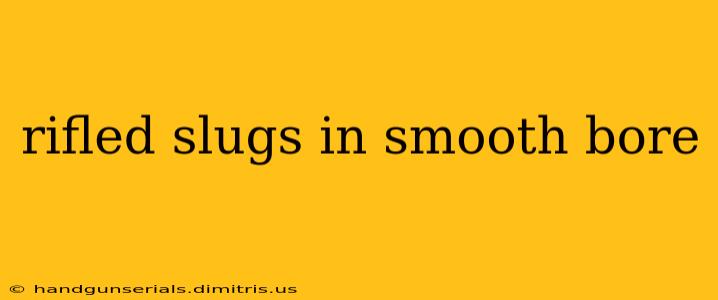The use of rifled slugs in smoothbore shotguns is a topic that sparks considerable debate among firearm enthusiasts. Understanding the mechanics, advantages, and disadvantages is crucial for making informed decisions about ammunition selection. This comprehensive guide delves into the intricacies of rifled slugs, exploring their performance characteristics and suitability for various shooting applications.
What are Rifled Slugs?
Unlike traditional foster slugs, which rely on the shotgun's choke to impart spin, rifled slugs possess their own rifling. This pre-engraved rifling in the slug itself provides a more consistent and accurate spin, leading to improved trajectory and reduced dispersion. The rifling grooves cut into the slug engage with the barrel's smooth bore, initiating spin upon firing. This contrasts with foster slugs, which depend on the barrel's constriction (choke) to impart spin, often resulting in less predictable flight characteristics.
Types of Rifled Slugs:
Several types of rifled slugs exist, each with its unique design and performance characteristics:
- Full-Bore Rifled Slugs: These slugs feature rifling that extends the full length of the slug, maximizing spin and potentially enhancing accuracy.
- Partial-Bore Rifled Slugs: These slugs only have rifling on part of their length. This design can sometimes improve loading and feeding in certain shotguns.
- Different Rifling Patterns: Rifling patterns vary between manufacturers, influencing bullet stability and accuracy. Some utilize relatively shallow grooves, while others use deeper, more aggressive cuts.
Advantages of Using Rifled Slugs in Smoothbore Shotguns:
The primary advantage of rifled slugs is their enhanced accuracy compared to traditional foster slugs. This improved accuracy translates to:
- Longer Effective Range: Rifled slugs maintain accuracy at significantly longer ranges than foster slugs.
- Flatter Trajectory: The consistent spin provides a flatter, more predictable trajectory, simplifying aiming at longer distances.
- Increased Downrange Energy: Improved accuracy means more consistent energy delivery to the target, enhancing stopping power.
Disadvantages of Using Rifled Slugs in Smoothbore Shotguns:
While rifled slugs offer substantial advantages, they also have drawbacks:
- Potentially Higher Cost: Rifled slugs are generally more expensive than foster slugs.
- Possible Barrel Wear: Some shooters express concerns about potential increased barrel wear, though this is often debated and depends heavily on the slug design and the firearm itself.
- Limited Availability: Depending on your location and the time of year, rifled slugs might be less readily available than foster slugs.
Choosing the Right Rifled Slug for Your Needs:
Selecting the appropriate rifled slug depends on several factors, including:
- Shotguns: Some shotguns are designed to handle rifled slugs more efficiently than others. Consult your firearm's manual to ensure compatibility.
- Intended Use: Target shooting at longer ranges requires slugs with superior accuracy. Home defense scenarios often prioritize stopping power and consistent patterns at closer ranges.
- Ammunition Manufacturer: Different manufacturers employ various rifling techniques and slug designs leading to varying performance characteristics. Researching different brands and their offerings is vital.
Conclusion: Rifled Slugs – A Powerful Choice
Rifled slugs offer a significant improvement in accuracy and range compared to their foster slug counterparts, making them a compelling choice for various applications. However, it's essential to weigh the advantages and disadvantages, understand compatibility with your specific shotgun, and choose a slug that suits your individual needs and shooting style. Proper research and selection will help you leverage the full potential of rifled slugs for more accurate and effective shooting.

